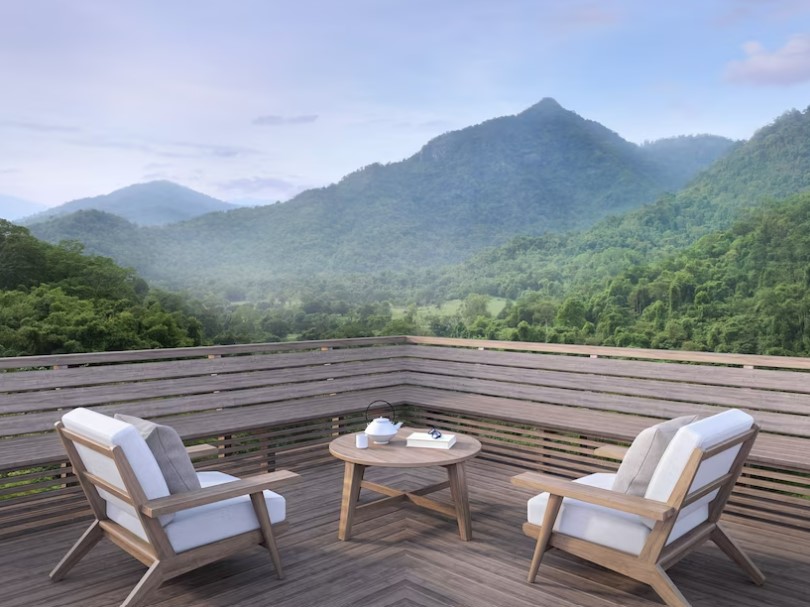Increased demand for environmentally friendly accommodation has prompted many accommodations to adopt more sustainable practices. to attract conscious tourists. This has encouraged more people to seek out and prefer accommodation options that are committed to protecting the environment.
In ABAL Consulting We develop innovative marketing strategies through to detailed cost analyses and recommendations to improve efficiency. One of our ways of supporting the hotel sector is our web-based trend forecasting tool: ABAL MyReports. You can try it and you will notice the difference in getting to know your guests better.
For this reason, we also offer you a guide to the emerging concept of eco-resorts. as a response to growing environmental concerns. It highlights the importance of these sites and their focus on sustainability, describing their eco-friendly practices, from the use of renewable energy to environmental education and support for the local community. It also explores key elements of eco-resorts, such as Glamping, sustainable gastronomy, activities and tours that connect guests with nature.
What is an Eco Resort?
An eco resort is a type of tourist accommodation that focuses on sustainability and environmental conservation. These sites are often integrated into natural settings, use environmentally friendly practices such as renewable energy, recycled materials and environmental conservation programmes to minimise their impact on nature.
These accommodations are often located in a variety of natural settings, from tropical beaches and rainforests to forests, mountains, coastal areas or remote areas with unique ecosystems. The idea is to make the most of and respect the natural beauty of the site, offering visitors a authentic experience in harmony with nature. Therefore, they can be found in places such as islands, rainforests, mountainous areas or even in nature reserves.
How can accommodation be eco-friendly?
Tourist accommodations can contribute to environmental sustainability in several ways:
- Use of renewable energy: installing solar panels, wind turbines or other renewable sources to reduce dependence on fossil fuels.
- Conservation practices: implementing recycling programmes, reducing water and energy consumption, and proper waste management.
- Environmental education: offering educational programmes for guests and staff on sustainable practices and the importance of conserving the natural environment.
- Supporting the local community: working with the local community to preserve culture, local employment and support sustainable community projects.
- Waste separation: set up recycling bins for plastic, paper, glass and other recyclable materials in common areas and rooms.
- Composting: create composting systems for organic waste, turning it into fertiliser for gardens or green areas.
- Reuse and reduction: promote the reuse of products by installing refillable shampoo and soap dispensers, minimising the use of disposable packaging.
- Separate collection programmes: organise clean-up days to collect waste in surrounding natural areas, raising awareness of the importance of caring for the environment.
- Environmental education: offer educational programmes to guests and employees on the importance of recycling and how to actively participate in these sustainable practices.
An outstanding example of sustainable tourist accommodation is the “Soneva Fushi“in the Maldives. This resort has been noted for its commitment to sustainability. It uses solar energy, has a comprehensive waste management programme that includes composting, recycling and plastic reduction, and has a focus on marine and terrestrial conservation. In addition, the resort is actively involved in local community projects to improve the lives of the people living on the islands. This holistic approach to sustainability makes it a role model in the tourism industry.
Accommodation and Glamping
Experiencing a stay in environmentally friendly accommodation goes beyond simply spending the night. It is about immersing oneself in an experience that awakens the senses and creates unforgettable memories. Glamping, a fusion of glamour and camping, has revolutionised this notion by offering a sustainable and versatile alternative for lovers of nature and comfort.
The importance of sustainable accommodation lies in offering travellers a deeper connection to the natural environment without sacrificing comfort. Glamping achieves this by combining outdoor adventure with luxurious amenities, enabling guests to immerse yourself in natural beauty without compromising on comfort and luxury.
Its growing popularity is due to its focus on sustainability.using natural materials and eco-friendly practices. The versatility of Glamping is impressive, as it adapts to diverse environments, from lush forests to remote deserts, offering unique experiences that stick in the memory of those who live them.
This style of accommodation represents not only an escape option but a commitment to the preservation of the environment and the pursuit of authentic experiences, capturing the essence of nature sustainably and luxuriously.
Clubhouse and Restaurants
Restaurants in eco-resorts are much more than places to satisfy the appetite; they are an essential part of the gastronomic and sustainable experience. they offer. With a focus on local and organic ingredients, these restaurants offer a fusion of authentic flavours and creative dishes that celebrate the culinary culture of the region.
From gourmet options to comfort dishes, every bite is a sensory experience that highlights freshness and quality, providing guests with a true delight for the palate while supporting sustainable practices in every dining choice.
The beating heart of the eco-resorts, it is a space designed to be the meeting point and epicentre of the guest community. It is a place where relaxation and connection are found in harmony, offering a cozy and versatile environment for various activities and events.
With elegant lounges and outdoor areas surrounded by lush greenery, the often referred to as the Club House, is the ideal place to celebrate intimate gatherings from to special events. Equipped with the latest audio-visual technologies and dedicated equipment, it is the perfect setting for conferences, weddings, corporate retreats or simply unforgettable social gatherings.
Design and Bamboo
Tourist accommodations can contribute to environmental sustainability by constructing buildings that respect the environment, using sustainable materials and environmentally friendly construction techniques. with the environment. There are sustainable accommodations that use bamboo as the main construction material.
Bamboo is known to be a fast-growing, renewable resource, as well as being hardy and versatile. Some resorts or accommodations have opted for using bamboo in construction of structures such as huts, bungalows or common areas due to their durability and low environmental impact. The use of bamboo is not only sustainable, but can also offer a unique aesthetic and a closer-to-nature accommodation experience.
Adventure Parks and Tours
Offering a wide range of indoor and outdoor activities is essential to satisfy the diverse preferences of tourists visiting eco-resorts. We understand that every traveller is looking for a unique experience, so it is necessary to provide a range of options to cater for different interests and lifestyles.
In-house activities, from craft workshops to yoga classes to local cuisine, are designed to immerse guests in local culture and encourage relaxation and creativity. Meanwhile, external options, such as guided nature walks, kayak tours or excursions to historic sites nearby, allow travellers to explore and connect with the natural and cultural environment that surrounds us.
The tours complement this experience by offering a deeper and more specialised perspective. Guided by local experts, these tours immerse visitors in the history, biodiversity and natural beauty of the region, enriching their understanding and appreciation of the place they are visiting.
This variety of activities and tours not only broadens the traveller’s experience, but also strengthens our commitment to sustainability by promoting conservation, sustainable respect for culture and connection with nature, ensuring that each guest takes away unforgettable and meaningful memories of their stay at the eco resorts.
Conclusion
Not all types of accommodation are suitable to be considered as eco-resorts. True eco-resorts are designed and operated with a strong focus on sustainability and environmental conservation.
Therefore, these accommodations usually follow specific design, construction and operating principles that minimise their environmental impact, using sustainable materials, eco-friendly technologies and environmental management practices. Not all accommodation meets these criteria to be considered as eco-resorts. Rely on us to turn challenges into opportunities and take your hotel to the next level of excellence!





 by
by 
